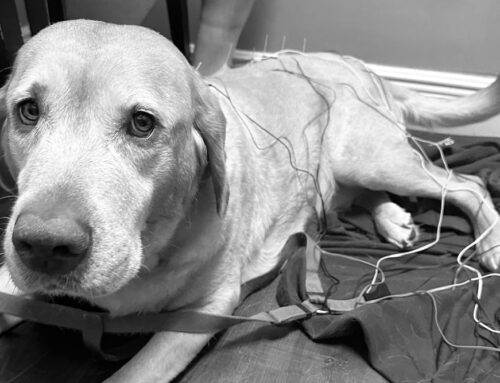
In a previous blog article we reviewed the importance of vaccines in dogs. We think it important to have a deeper discussion on one specific vaccine against a bacterial disease called leptospirosis, or lepto for short. While it is not considered a core, or required, vaccine, the lepto vaccine is still highly recommended for many of our pets here in Florida. Many of our patients are at risk for this disease due to their lifestyle.
Unfortunately, there are a lot of misconceptions about the leptospirosis vaccine. For example, our vets at West Park Animal Hospital will frequently hear concerns about reactions to the lepto vaccine. However, in a study done in 2015 of 130,000 dogs, it was found that the risk of reaction to the lepto vaccine is actually quite low. It was really no different than the risk of reaction to any of the other vaccines commonly administered to our canine patients. We know you want what is best for your pet and having all of the information will help you make the right decisions for your four-legged family member.
What is Leptospirosis?
Leptospirosis is a bacterial infection that can affect both dogs and people. It is considered zoonotic, meaning it can actually be transferred from our pets to us. There are four main types, or serovars (icterohaemorrhagiae, grippotyphosa, pomona and canicola) that we vaccinate against. It typically lives in soil for several months in temperatures between 32-77F. This makes Florida the perfect environment for it’s spread. Stagnant or slow moving water, like what occurs after high rainfall or flooding, may also contain the leptospirosis bacteria. It can even survive in a just a few drops of liquid. Once contracted, leptospirosis can cause a wide variety of symptoms, which can make dogs quite ill. In severe cases, it may even be fatal.
How Does my Dog Get Leptospirosis?
Dogs can be exposed to this potentially life-threatening disease in several ways. Areas of flooding (such as after a hurricane) or pools of water, like what are found in the natural preserves in Westchase, Keystone and Odessa can easily become contaminated with lepto. When pets drink from these areas, they are at risk of becoming infected. Lepto can also enter through healthy skin if a dog walks through these same puddles or pools.
Dogs may also contract the disease from exposure to wildlife carriers. One study showed that up to 50% of all raccoons and rats may carry leptospirosis. Skunks are also a well-documented carrier. These animals can infect dogs through bites, contaminated urine or infected muscle tissue. They may also act as sources of infection contaminating soil or water with their urine. A common misconception is that only pets that live in rural areas should receive this vaccine. However, there has been a significant uptick in lepto cases in urban areas most likely due to exposure to animals like raccoons and rats.
How do I know if my Dog Has Leptospirosis?
Once a dog is infected with lepto, they can experience a wide range of symptoms. These can vary from mild to permanent and life-threatening damage of the liver and kidneys. The types of symptoms a dog exhibits depends on the phase of the disease, individual patient and the type of leptospirosis that has been contracted.
The most common symptoms of leptospirosis are vomiting, decreased appetite, lethargy, muscle pain and fever. However, pets can also experience bruising, diarrhea, increased or decreased thirst and urination and yellowing of the skin. If your pet is experiencing any of these symptoms it is highly recommended that they be examined by a veterinarian.
There are several testing options to determine if leptospirosis could be the underlying cause. The veterinarian will choose which test to run based on available samples, duration of disease and lab access.
How is Leptospirosis Treated?
The good news is that lepto can be treatable, especially in the early stages. The bacteria can be eliminated with certain types of antibiotics. In most pets, however, additional supportive care may be needed to prevent further damage to vital organs. The veterinarian may recommend treatments to manage shock symptoms, correct dehydration or electrolyte imbalances or control bleeding disorders. The longer this disease is left untreated, the more likely it is for permanent damage to occur. The veterinarians at West Park Animal Hospital can walk you through the appropriate testing and treatment options for your pet.
Should my Pet Be Vaccinated Against Leptospirosis?
 Vaccination against leptospirosis is recommended for the majority of pets who live in Florida. This is simply because the moist, warm environment we experience year round makes the perfect home for lepto. We become particularly worried about this disease for pets who live in areas frequented by wildlife such as raccoons, skunks or rats. It is also highly recommended for pets who may be exposed to moist soil or standing water with some level of frequency. So, if you live in an area prone to flooding, your pet would qualify. Finally, pets that visit dog parks or boarding facilities are at higher risk of exposure, and should therefore be vaccinated.
Vaccination against leptospirosis is recommended for the majority of pets who live in Florida. This is simply because the moist, warm environment we experience year round makes the perfect home for lepto. We become particularly worried about this disease for pets who live in areas frequented by wildlife such as raccoons, skunks or rats. It is also highly recommended for pets who may be exposed to moist soil or standing water with some level of frequency. So, if you live in an area prone to flooding, your pet would qualify. Finally, pets that visit dog parks or boarding facilities are at higher risk of exposure, and should therefore be vaccinated.
There are 4 main serovars or types of leptospirosis. If you decide to have your pet vaccinated against lepto, it is recommended to use a vaccine that covers for all 4 types. The vaccine is typically started during the puppy vaccine series around 12 weeks of age. However, it can be given to any dog at any time. It should be considered in adults if a recent move or lifestyle change puts a pet suddenly more at risk. The vaccine is administered initially, then a booster is given 3-4 weeks later. It can be given annually after that. There is a lepto only vaccine, but there is also a combination vaccine for distemper, parvo virus, adenovirus, parainfluenza and leptospirosis.
How Can We Help?
If you feel your pet may benefit from the leptospirosis vaccine, or you have more questions regarding this disease or the prevention, the vets and staff at West Park Animal Hospital would be happy to help. As always, the veterinarians at West Park Animal Hospital want you to feel comfortable with the care your pet is getting. We’ve designed all of our appointments to provide ample time to discuss all of your concerns and answer your questions. What is most important to us is that we provide your pet with the highest level of care by creating an individual plan for each of patients. If you’d like to discuss more about your pet’s needs, call us at (813) 749-6863 for an appointment or conveniently schedule one on our website.






Leave A Comment